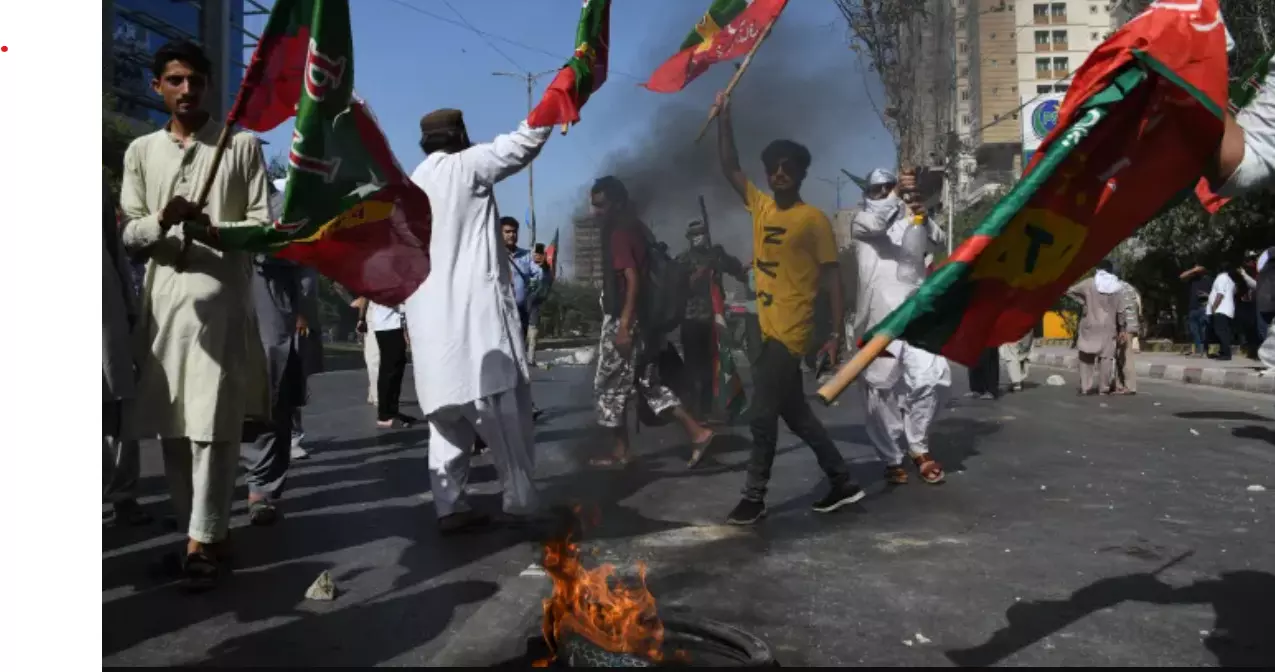Reverberating mayhem
Even after the passage of one year of the notorious upheaval on May 9 last year, Pakistan continues to reel under socio-political instability on one front or the other

Barely 10 days ago, Pakistan observed the completion of one year of the unsettling incident that ultimately led to tremulous developments in the country, snowballing into a major political upheaval. This began with the arrest of Prime Minister Imran Khan and the large-scale incarceration of Pakistan Tehreek-e-Insaf (PTI) members.
Dwelling upon the developments under reference, the most prominent Pakistani daily ‘Dawn’ opined (May 9) that very little appears to have changed, at least from the political perspective. It said, in fact, there is even more bad blood between the PTI and the security establishment, and both sides appear reluctant to reconsider the belligerent stance they have taken towards each other. In a press conference (May 7), the military spokesperson clarified that there would be no moving forward without a “sincere” apology from the PTI and a public disavowal of the politics of anarchy and hate. In response, however, the PTI denounced the statement.
Hence, it cannot be denied that the violence directed at military symbols and installations included the ransacking of the Lahore Corps Commander's House. He produced some statistics as well to prove why it was wrong to assess that the PTI had won the February 8 elections. The military spokesperson also turned towards India and blamed it for orchestrating terror activities in Pakistan.
Now that Pakistan’s “love affair” with Afghanistan has stalled and gone sour despite celebrating the Afghan Taliban’s victory over the US over a cup of tea, it seems Pakistan’s game is back to square one—blaming India for everything, its favourite game.
According to ‘Dawn’, the PTI should now acknowledge that it acted in an extremely irresponsible manner by leading its supporters towards such an unacceptable reaction. Thousands were targeted in reprisals by the state, and the events of the day accelerated the expansion of unelected forces’ influence in the state’s legislative and administrative apparatus.
However, the state is not without blame. Rather than acting with restraint and demonstrating that it was only interested in getting justice for the wrong that had been caused, it responded with harsh measures that seemed to have been taken from the track record of previous dictatorial regimes.
To cite an illustration, in seeking ‘justice’ for PTI supporters’ defacement of various installations, the homes of countless civilian suspects were raided and vandalized, and their residents harassed by the authorities. Even women prisoners were targeted.
The PTI-military stalemate, as per ‘Dawn’, has been the primary cause of Pakistan’s political instability. Since neither side seems interested in a resolution, perhaps the government should step in. It can offer its best resources to prosecute the May 9 cases in civilian courts, thereby ensuring a transparent judicial process. If transparent action is undertaken, this will prevent the two sides from engaging directly with each other and taking a confrontational path.
According to scholars’ opinions carried by ‘The Express Tribune’ (another popular daily), observing the May 9 anniversary in the history of Pakistan politics, there have been several thousand May 9s. It was a May 9 for the politicians when, on three different occasions, civilian governments were taken over by military dictators. It was May 9s for the judiciary when, on several occasions, they were disgraced, sent home, intimidated, and pressured to give favourable judgments. It was May 9s when every election was rigged in Pakistan and pseudo-political pressure groups were formed to dismantle the so-called anti-establishment party. Pakistan has seen several May 9s in Karachi, but one stands out — the mayhem in May 2007, when Karachi police were asked to sit back and see the city descend into chaos. It is May 9 for the people of Pakistan when its intelligence agencies record private moments of influential individuals’ lives to blackmail them. It is May 9 for this country when no Prime Minister is allowed to finish his tenure in office and is thrown out with disgrace. This country has May 9 every day. These are strong words which merit attention and cannot be ignored.
These examples exhibit how hollow Pakistan’s existing inherent system is. In the same vein, according to a large section of the intelligentsia, Pakistan is several decades behind India and even Bangladesh, not to mention that terrorism has returned with full fury.
Pakistan watchers reckon that to avoid another May 9, Pakistan’s power paradigm will have to be readjusted. The billion-dollar question is: are there any takers for this long-awaited suggestion? This is the question many Pakistanis are asking on the first anniversary of its May 9 upheaval. The answer, perhaps, is elusive at least for the time being.
The writer is a retired IPS officer, Adviser NatStrat, and a former National Security Advisor in Mauritius. Views expressed are personal



